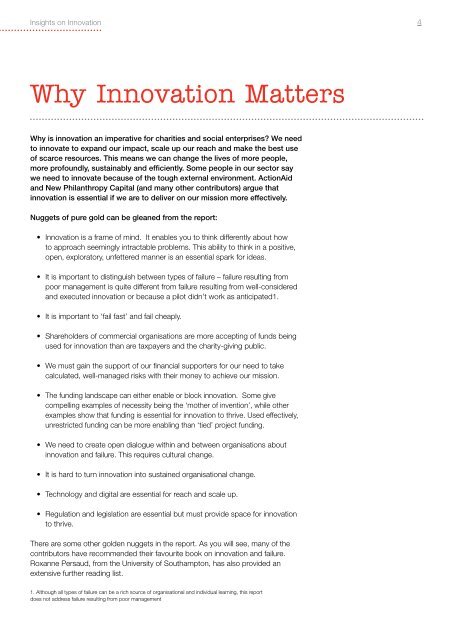O0YQ5
O0YQ5
O0YQ5
You also want an ePaper? Increase the reach of your titles
YUMPU automatically turns print PDFs into web optimized ePapers that Google loves.
Insights on Innovation<br />
4<br />
Why Innovation Matters<br />
Why is innovation an imperative for charities and social enterprises? We need<br />
to innovate to expand our impact, scale up our reach and make the best use<br />
of scarce resources. This means we can change the lives of more people,<br />
more profoundly, sustainably and efficiently. Some people in our sector say<br />
we need to innovate because of the tough external environment. ActionAid<br />
and New Philanthropy Capital (and many other contributors) argue that<br />
innovation is essential if we are to deliver on our mission more effectively.<br />
Nuggets of pure gold can be gleaned from the report:<br />
• Innovation is a frame of mind. It enables you to think differently about how<br />
to approach seemingly intractable problems. This ability to think in a positive,<br />
open, exploratory, unfettered manner is an essential spark for ideas.<br />
• It is important to distinguish between types of failure – failure resulting from<br />
poor management is quite different from failure resulting from well-considered<br />
and executed innovation or because a pilot didn’t work as anticipated1.<br />
• It is important to ‘fail fast’ and fail cheaply.<br />
• Shareholders of commercial organisations are more accepting of funds being<br />
used for innovation than are taxpayers and the charity-giving public.<br />
• We must gain the support of our financial supporters for our need to take<br />
calculated, well-managed risks with their money to achieve our mission.<br />
• The funding landscape can either enable or block innovation. Some give<br />
compelling examples of necessity being the ‘mother of invention’, while other<br />
examples show that funding is essential for innovation to thrive. Used effectively,<br />
unrestricted funding can be more enabling than ‘tied’ project funding.<br />
• We need to create open dialogue within and between organisations about<br />
innovation and failure. This requires cultural change.<br />
• It is hard to turn innovation into sustained organisational change.<br />
• Technology and digital are essential for reach and scale up.<br />
• Regulation and legislation are essential but must provide space for innovation<br />
to thrive.<br />
There are some other golden nuggets in the report. As you will see, many of the<br />
contributors have recommended their favourite book on innovation and failure.<br />
Roxanne Persaud, from the University of Southampton, has also provided an<br />
extensive further reading list.<br />
1. Although all types of failure can be a rich source of organisational and individual learning, this report<br />
does not address failure resulting from poor management


